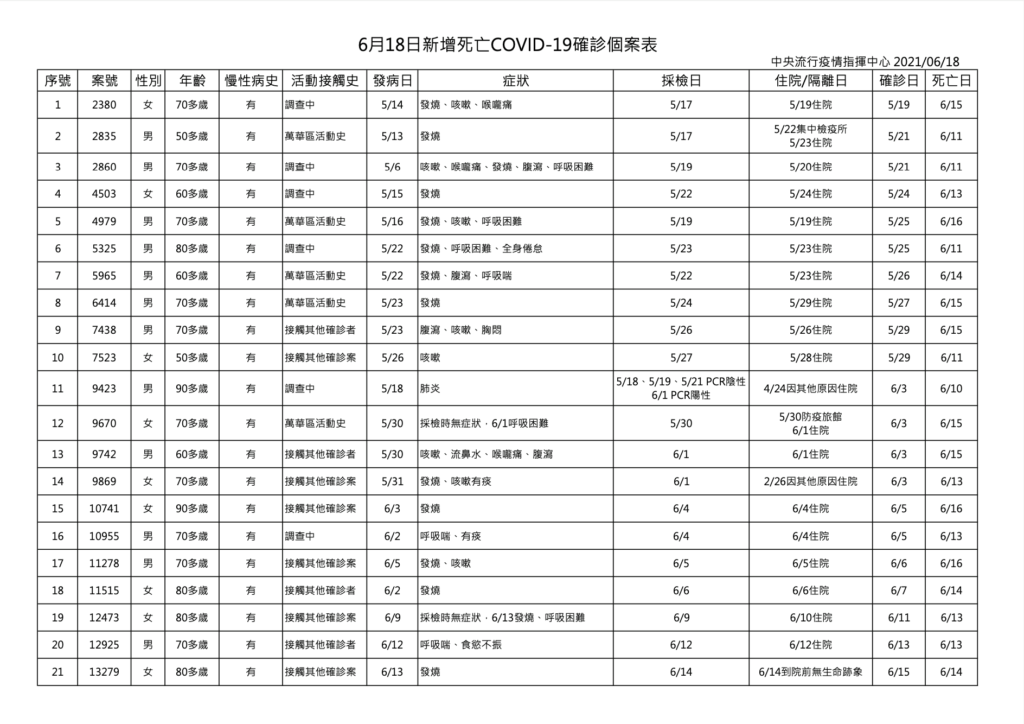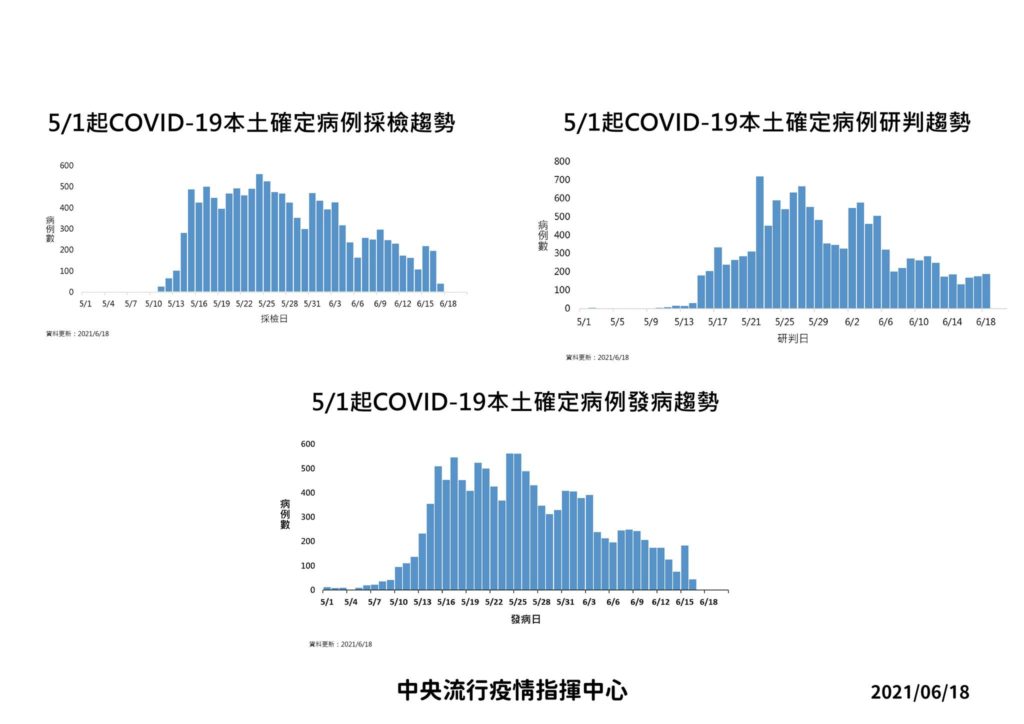by Brian Hioe
語言:
English
Photo Credit: Ko Wen-je/Facebook
187 DOMESTIC CASES, along with one imported case, were announced at the Central Epidemic Command Center press conference today. 21 deaths were also announced.
Cases were up in the greater Taipei area today, with New Taipei having 76 cases, and Taipei having 71 cases. There were 26 cases in Miaoli, six cases in Taoyuan, four cases in Keelung, two cases in Taichung, one case in Hualien, and one case in Hsinchu County.
The cases in Miaoli are primarily migrant workers already under quarantine, with second and third round testing taking place among migrant workers. Minister of Health and Welfare Chen Shih-chung expects cases in Miaoli to decline soon, with low rates of infection in the community outside of the existing clusters. The CECC denied claims that it has been revising statistics for the Miaoli clusters, while stating most of these cases were asymptomatic.
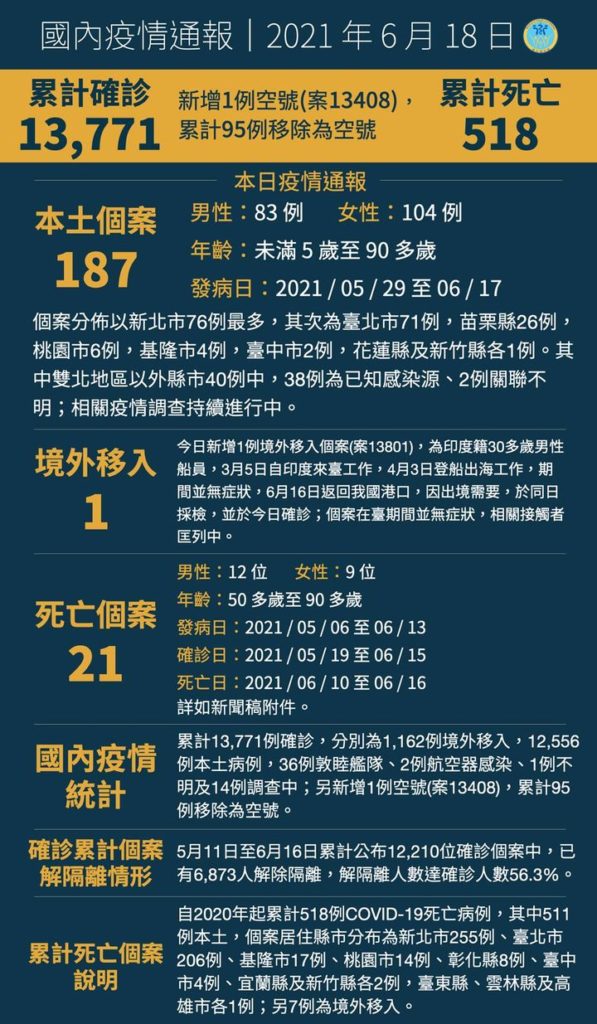 Infographic on the new cases announced today. Photo credit: Ministry of Health and Welfare/Facebook
Infographic on the new cases announced today. Photo credit: Ministry of Health and Welfare/Facebook
Minister of Health and Welfare Chen Shih-chung stated in the legislature today today that he expects deaths to continue to be high for COVID-19 over the next week. The number of deaths more accurately reflects the outlook for COVID-19 for earlier periods of the outbreak.
Online seminars will be set up to provide instruction on treating severe COVID-19 patients. Antibody medication to treat cases that have not yet become severe cases has arrived in Taiwan. Hospitals can apply to the CECC to use this medication on suitable patients. Use of these medications will be publicly paid for.
The Taipei Agricultural Products Marketing Corporation (TAPMC) has a new employee that is positive with COVID-19, with 18 employees having been confirmed positive for COVID-19 to date during the pandemic. 18 contacts have been listed for home quarantine. TAPMC, which plays a large role in the distribution of agricultural products in greater Taipei, stopped work yesterday and today to disinfect. Work shifts at TAPMC will be divided.
The chairman of the Concentric Patriotism Alliance, a pro-unification group known for violence against pro-independence demonstrators, has died of COVID-19. The group has blamed his death on the Tsai administration. Deaths of elderly pro-unification advocates are likely to be blamed on the Tsai administration by members of the pan-Blue camp.
It is expected that Taiwan may soon be added to the European Union’s safe travel list. Despite the recent outbreak of cases in Taiwan, Taiwan still has relatively low cases by global standards, and trends continue to be downward. It is to be seen whether there will be reciprocal arrangements made for European travelers to Taiwan, if they are vaccinated.
Taipei mayor Ko Wen-je stated today that he still believes overall cases will halve every week, even if cases doubled for Taipei today compared to yesterday, and that Wanhua is no longer a hotspot, even if there were more cases in Wanhua today. Ko stated that he does not believe universal testing is useful, because of low rates of infection in neighborhoods, preferring to rely on known cases. In response to the proposition that members of the public should be allowed a choice in which vaccine they take, Ko stated that he believes that the public should be informed of which vaccine is available in which vaccination location, though it is possible this could lead to crowding at vaccination sites. The Taipei city government will send notifications to individuals that fail to arrive for vaccination appointments.
Deaths announced today (left) and further data released by the CECC (right). Photo credit: Ministry of Health and Welfare/Facebook
When asked, Chen Shih-chung stated that testing all arrivals to Taiwan would not be not especially effective, seeing as negatives are still quarantined, and positives would immediately be quarantined but they would likely show symptoms in quarantine if infected. Similarly, when asked about a proposal from former President Ma Ying-jeou to allow for Taiwanese to travel to China through the Three Small Links to be vaccinated, Chen stated that there are no plans for this currently.
The narrative that the AstraZeneca vaccine is causing sudden deaths among the elderly is growing. This can be seen in headlines and reporting in many media outlets.
Of 25 cases yesterday reported as having died after vaccination, 14 deaths were above 85 years old, 6 were between 75 to 85, three were between 65 to 75, and two below 65. Five lived in long-term care institutions, four were undergoing dialysis, 22 had underlying conditions, and the rest are under investigation.
The CECC states stressed that no cases of deaths have occurred due to blood clots to date. Likewise, the CECC cited that there were more than 17,000 cremations between January and May in greater Taipei in 2018, 18,800 for the same period in 2019, and 19,400 cremations this year. Taiwan is approaching becoming a super-aged society, and this leads to increasing death rate. The CECC cites statistics comparing deaths in Taiwan after vaccination to South Korea to show that this was comparable.
Indeed, while the CECC has stressed that 260 people over 75 pass away every day and this overlaps with the 70,000 to 80,000 individuals being vaccinated every day, one does not expect this to convincing of some members of the Taiwanese public, as amplified by news reporting to this effect. One expects journalists at the daily CECC press conference to continually ask questions about the safety of AstraZeneca vaccines going forward, which will make doubts about the safety of AstraZeneca appear increasingly legitimate.
Chen emphasized that AZ is effective for the elderly, but deaths or blood clots may have to do with preexisting conditions or poor health. The CECC was questioned as to whether AstraZeneca vaccines was not suitable for Asians or whether the government will begin vaccinating the elderly with Moderna vaccines and allowing the young to be vaccinated with AstraZeneca vaccines, but Chen stated that the CECC had not decided plans for this, and the government still encourages people to be vaccinated—even if they have preexisting conditions.
300,000 NT will be provided to the families of individuals that die after vaccination. PCR testing will be conducted on the deceased. The CECC will provide relevant statistics so that the elderly can come to their own decision about vaccinated. To this extent, the CECC stated that individuals going to test sites should be careful of the heat, given the potential for this to affect the elderly.
Information released by the CECC about deaths that have taken place after vaccinations. Photo credit: Ministry of Health and Welfare/Facebook
More generally, with there already being fears regarding the safety and effectiveness of domestically manufactured vaccines, one expects vaccine skepticism to be on the rise in Taiwan.
52% of individuals over 85 have been vaccinated in some places, such as in New Taipei. According to Chen, categories one to three have been mostly vaccinated, allowing for further categories to be opened up soon. Foreigners will be eligible for vaccines based on if they are in the categories for vaccination, using ARCs as ID equivalents for vaccination.
240,000 doses of the Moderna vaccine are scheduled to arrive in Taiwan today at 4:55 PM. Some reports state that 410,000 further doses of Moderna are scheduled to arrive two days from now, though Chen Shih-chung reacted with apparent surprise when asked by journalists about claims that 410,000 doses would arrive in two days.
750,000 doses donated by the US are expected to arrive before the end of the month, which reports currently suggest are also Moderna vaccines—though previous reports suggested that they could be Johnson & Johnson vaccines. As such, up to 1.4 million vaccines may arrive in Taiwan in the next two weeks.
This accords to comments by President Tsai Ing-wen that two million vaccines would arrive in Taiwan by this month, if one accounts not only for the 1.4 million vaccines that are may arrive in Taiwan in the next two weeks, but the 1.24 million vaccines donated to Taiwan by Japan earlier this month. Although Tsai stated that ten million vaccines would arrive by August, it is generally thought that Tsai was referring to domestically manufactured vaccines.
Though not widely reported on, according to the Liberty Times, when questioned by Congress, Deputy Assistant Secretary of State for East Asian and Pacific Affairs Jonathan Fritz stated that the US was in discussion with Taiwan about the possibility of contract manufacturing AstraZeneca vaccines.
The CECC previously stated that negotiations with AstraZeneca fell through because the manufacturer hoped for Taiwan to produce 300 million doses, while Taiwan only had the capacity for 100 million doses. The CECC also alleged possible Chinese interference, which may not be mutually exclusive as a claim, if this led AstraZeneca to impose unrealistic production targets on Taiwan. Australia, which has a similar population to Taiwan, is currently domestically manufacturing one million doses of AstraZeneca per week.
Chen Shih-chung reacted against a journalist who claimed that the government had turned down receiving the rights to domestically manufacture vaccines last year during the CECC press conference. According to Chen, talks fell through because of Taiwan’s lack of technical capacity to produce mRNA vaccines, likely referring to discussion to manufacture Moderna that Chen had previously alluded to. However, Taiwan has improved its technical capacities now.
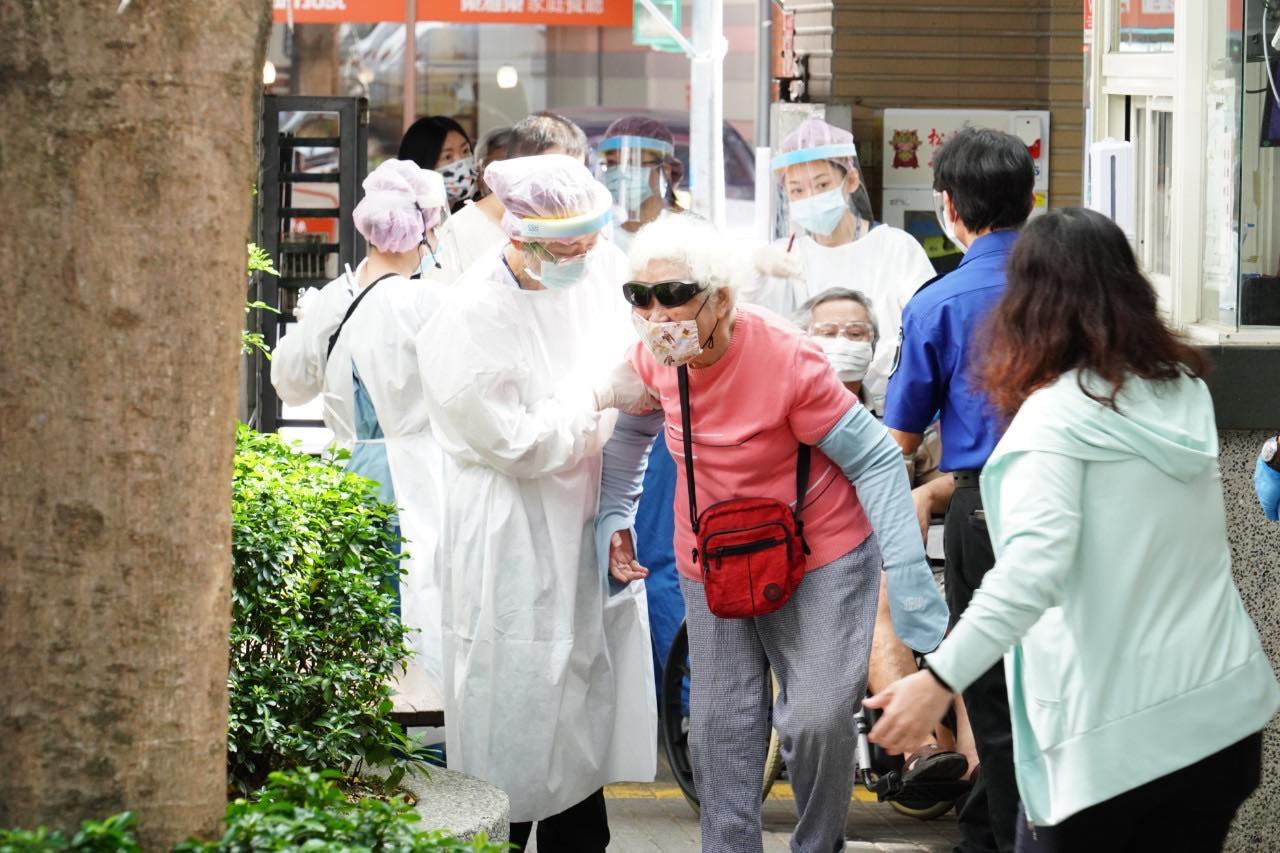 Medical personnel assisting elders for vaccinations. Photo credit: Ko Wen-je/Facebook
Medical personnel assisting elders for vaccinations. Photo credit: Ko Wen-je/Facebook
Chen stated that Taiwan is currently in talks with two companies about receiving the rights to domestically manufacture foreign brands, though it is to be seen whether these talks will be successful.
The KMT sought to attack domestically-manufactured vaccines by claiming that they were among the most expensive vaccines in the world, costing 881 NT per dose. In response, DPP majority speaker Ker Chien-ming stated that Terry Gou had been hoping to purchase BioNTech vaccines for 42 USD per dose, which is around 1,166 NT per dose.
The Executive Yuan announced this morning that Terry Gou’s FoxConn was informed by BioNTech on June 16th that it only intended to sell to national governments. However, the Executive Yuan stated that it was still willing to cooperate with non-government in facilitating vaccine purchases, by allowing these organizations to play a supportive role in vaccine purposes.
To this extent, the Executive Yuan also announced that the Taiwan Semiconductor Manufacturing Company (TSMC) also intended to purchase vaccines. Like FoxConn, TSMC intends to purchase five million vaccines. The Executive Yuan stated that it would be willing to cooperate with other non-governmental groups that hoped to purchase vaccines in the future and also asserted that the German government was assisting in efforts by Taiwan to negotiate with BioNTech.
While the Executive Yuan denied that it had asked TSMC to purchase vaccines, TSMC’s involvement cushions the Tsai administration against accusations that it sought to sabotage attempts by Terry Gou to purchase vaccines, because of hostility toward Gou as a member of the pan-Blue camp, or simply in order to monopolize power over vaccine purchases. Former TSMC chair Morris Chang is trusted by the Tsai administration, as seen in Tsai appointing him as Taiwan’s representative to APEC in 2020.
Though TSMC’s involvement lends the appearance of bipartisanship to the prospect of vaccine purchases by non-government organization, it is possible that pan-Blue local governments may continue with attempts to purchase vaccines independently of the central government. The arrangement allows Gou to save some face, as well, with regards to the failure of his attempt to purchase vaccines.
Gou is reportedly seeking a meeting with President Tsai Ing-wen, which she has already agreed to. The meeting could take place as soon as this afternoon.
Chen Shih-chung similarly stressed cooperation with non-government organizations at the CECC press conference today, while also seeking to reassure that the government would ensure such vaccines purchased by Gou or TSMC would be from Germany. How to share the costs will be discussed, such as if Gou or TSMC will pay for the refrigeration of vaccines.
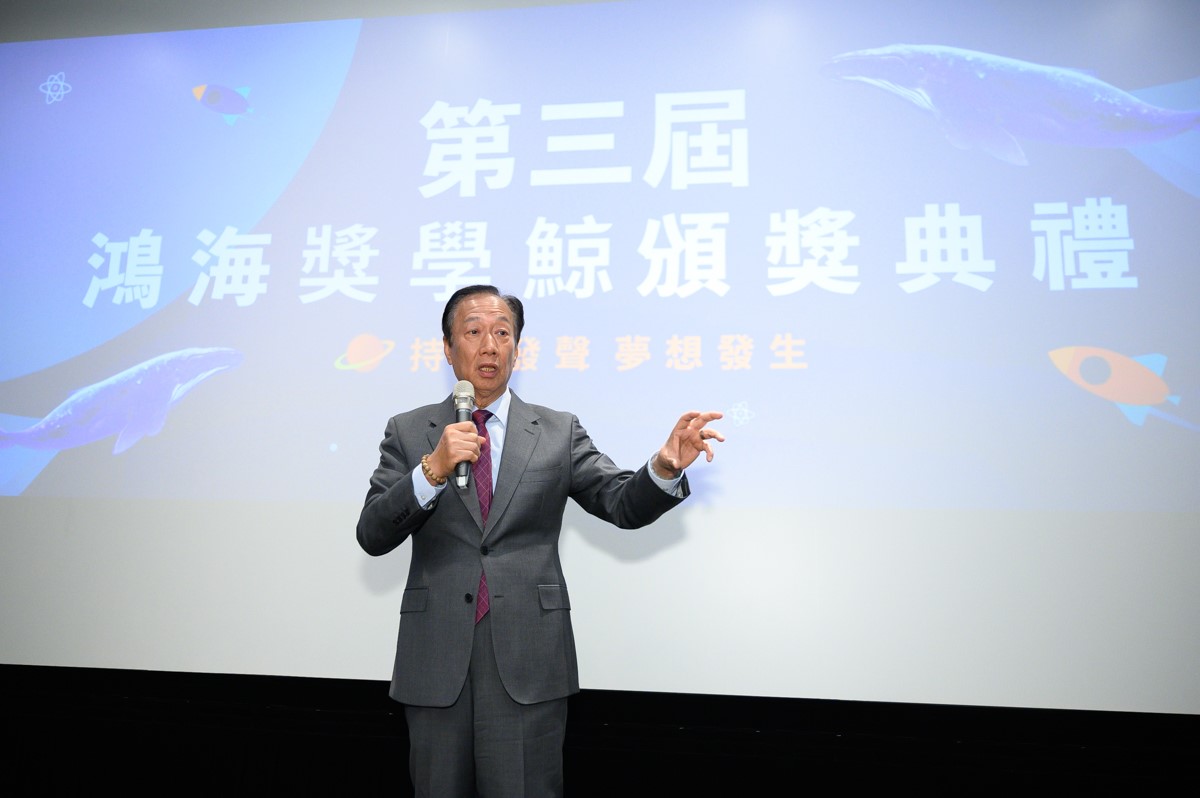 FoxConn CEO Terry Gou. Photo credit: Terry Gou/Facebook
FoxConn CEO Terry Gou. Photo credit: Terry Gou/Facebook
Nevertheless, it is to be seen if Gou pushes back against the Executive Yuan’s framing, similar to how members of Gou’s camp reacted against claims by DPP majority speaker Ker Chien-ming that Gou had sought his aid in vaccine purchases. It is also to be seen if China, which was accused of acting through BioNTech’s greater China distributor, Shanghai Fosun, reacts to these developments. Shanghai Fosun has close ties to the Chinese government, as one might expect from one of the largest conglomerates in China.
While it is not surprising that Gou’s attempts to purchase vaccines ultimately ran aground due to global scarcity, it is possible that TSMC’s fronting of vaccine acquisition efforts may be more successful. This is due to TSMC’s centrality to global supply chains. TSMC involvement also raises previous propositions that involved the company in efforts to obtain vaccines, such as trading semiconductors for vaccines.


